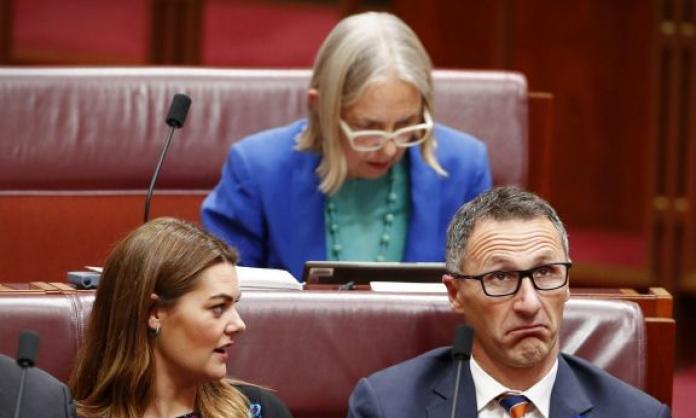The most recent conflict over NSW senator Lee Rhiannon’s temporary exclusion from the party room shows that differences within the Greens are being increasingly fought on the much more conservative terrain of constitutionality and process, rather than the political differences between the left and the right.
While the party room’s attack on Rhiannon was couched in terms of demanding that NSW abandon its procedure of binding its MPs to party policy, this was just a means to an end. The desire by the leadership of the Greens to enshrine the conscience vote for MPs, endorsed very strongly by former leader Bob Brown, gives the MPs freedom to pick and choose which policies will facilitate the party’s further integration into the mainstream.
Rhiannon’s initial response to her exclusion from the party room was a political one: to reiterate her support for local Greens groups opposed to the Turnbull government’s cuts to school funding. At the time, the Greens parliamentarians were trying to do a deal with that very government to “improve” the education cuts. She also pointed out that she was merely upholding the democratic will of NSW Greens members who had determined that political position, and defended the idea that MPs should not just make up their own minds about how to vote and what deals to do, independent of party policy.
But Rhiannon also said, at a Greens forum in Brisbane, held just after she had gained support from the National Union of Students education conference, “I just want to put on the record that I disagree with the description in a motion that was recently passed that described the federal parliamentary leadership as ‘right wing’”.
The left-right division, though, is plainly visible. Focusing on process – such as whether the exclusion was unconstitutional – over politics has meant that the left in the NSW Greens has allowed itself to be bound by ridiculous anti-democratic rules that prevent candidates from criticising one another. In preselection contests, they have shied away from admitting that candidates have political differences, let alone arguing about them.
The NSW Greens now focus on the much more tepid issues of their decentralised and grassroots organisational structures rather than the real political differences that exist within and between state branches. A recent article in New Matilda, “Why Bob Brown is wrong, Lee Rhiannon is right and the Greens are in trouble”, by two NSW Greens veterans, Geoff Ash and Hall Greenland, focuses almost entirely on this question.
So, for example, Ash and Greenland laud the argument made by the NSW Greens at the time of the formation of the Australian Greens “that there should be a high degree of state autonomy within the confederation so that state parties could run their own affairs”.
Yet look at the response to the Tasmanian section of the party after it pleaded with the Liberals to form a coalition government in 2010. Not one of the other states came out to oppose this. The federated nature of the party simply allowed the Tasmanians to get away with this opportunism unopposed.
Nor is the consensus decision-making model adopted by the Greens a radical challenge to conventional politics. It can be a thoroughly anti-democratic and authoritarian process with the potential to allow a right wing lowest common denominator politics to prevail on the basis of a false unity that simply glosses over political arguments. The demand for consensus in the party room was one of the weapons used by the right against Lee Rhiannon.
Where the Greens enshrine an alternative to consensus in their organisational structures, it is not the democratic will of the majority that prevails. For example, the constitution of the Greens in Victoria allows a vote as a last resort when consensus cannot be achieved. But it must achieve a 75 percent majority.
State branch autonomy and consensus decision making can be wielded just as well by the right as the left.
The Greens' willingness to deal with the Liberals has been accompanied by increasing attacks on the left by Richard Di Natale. This is not new. In 2011, Bob Brown used his personal authority to attack the NSW branch when it came under assault by the Murdoch press for its support for boycotting Israel. Although it was NSW Greens policy, Bob Brown’s pressure resulted in two councillors changing their vote. The policy was rescinded.
The more the Greens have electoral success, the more likely they are to bend to conservative pressure on “controversial” positions, and to show themselves as responsible dealmakers who can get things done with whichever party is in government.
Deals with the Liberals before the 2016 federal election on pensions, multinational tax avoidance and Senate voting reform meant that even Liberal headkicker Michael Kroger could say of the Greens that they are “not the nutters they used to be”.
All this is a political, rather than a constitutional problem. Simply defending the “processes” will not hold back the right wing trajectory that the party has been on for more than a decade.









